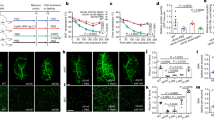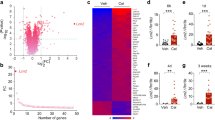Abstract
Leptin is an adipocyte-derived hormone that plays a key role in energy homeostasis, yet resistance to leptin is a feature of most cases of obesity in humans and rodents. In vitro analysis suggested that the suppressor of cytokine signaling-3 (Socs3) is a negative-feedback regulator of leptin signaling involved in leptin resistance. To determine the functional significance of Socs3 in vivo, we generated neural cell–specific SOCS3 conditional knockout mice using the Cre–loxP system. Compared to their wild-type littermates, Socs3-deficient mice showed enhanced leptin-induced hypothalamic Stat3 tyrosine phosphorylation as well as pro-opiomelanocortin (POMC) induction, and this resulted in a greater body weight loss and suppression of food intake. Moreover, the Socs3-deficient mice were resistant to high fat diet–induced weight gain and hyperleptinemia, and insulin-sensitivity was retained. These data indicate that Socs3 is a key regulator of diet-induced leptin as well as insulin resistance. Our study demonstrates the negative regulatory role of Socs3 in leptin signaling in vivo, and thus suppression of Socs3 in the brain is a potential therapy for leptin-resistance in obesity.
This is a preview of subscription content, access via your institution
Access options
Subscribe to this journal
Receive 12 print issues and online access
$209.00 per year
only $17.42 per issue
Buy this article
- Purchase on Springer Link
- Instant access to full article PDF
Prices may be subject to local taxes which are calculated during checkout




Similar content being viewed by others
References
Zhang, Y. et al. Positional cloning of the mouse obese gene and its human homologue. Nature 372, 425–432 (1994).
Considine, R.V. et al. Serum immunoreactive-leptin concentrations in normal-weight and obese humans. N. Engl. J. Med. 334, 292–295 (1996).
Ahima, R.S. & Flier, J.S. Leptin. Annu. Rev. Physiol. 62, 413–437 (2000).
Friedman, J.M. & Halaas, J.L. Leptin and the regulation of body weight in mammals. Nature 395, 763–770 (1998).
Ghilardi, N. et al. Defective STAT signaling by the leptin receptor in diabetic mice. Proc. Natl. Acad. Sci. USA 93, 6231–6235 (1996).
Bates, S.H. et al. STAT3 signalling is required for leptin regulation of energy balance but not reproduction. Nature 421, 856–859 (2003).
Gao, Q. et al. Disruption of neural signal transducer and activator of transcription 3 causes obesity, diabetes, infertility, and thermal dysregulation. Proc. Natl. Acad. Sci. USA 101, 4661–4666 (2004).
Schwartz, M.W., Peskind, E., Raskind, M., Boyko, E.J. & Porte, D. Jr. Cerebrospinal fluid leptin levels: relationship to plasma levels and to adiposity in humans. Nat. Med. 5, 589–593 (1996).
Carpenter, L.R. et al. Enhancing leptin response by preventing SH2-containing phosphatase 2 interaction with Ob receptor. Proc. Natl. Acad. Sci. USA. 95, 6061–6066 (1998).
Elchebly, M. et al. Increased insulin sensitivity and obesity resistance in mice lacking the protein tyrosine phosphatase-1B gene. Science 283, 1544–1548 (1999).
Zabolotny, J.M. et al. PTP1B regulates leptin signal transduction in vivo. Dev. Cell 2, 489–495 (2002).
Cheng, A. et al. Attenuation of leptin action and regulation of obesity by protein tyrosine phosphatase 1B. Dev. Cell 2, 497–503 (2002).
Yasukawa, H., Sasaki, A. & Yoshimura, A. Negative regulation of cytokine signaling pathways. Annu. Rev. Immunol. 18, 143–164 (2000).
Bjorbaek, C., Elmquist, J.K., Frantz, J.D., Shoelson, S.E. & Flier, J.S. Identification of SOCS-3 as a potential mediator of central leptin resistance. Mol. Cell. 1, 619–625 (1998).
Bjorbaek, C. et al. SOCS3 mediates feedback inhibition of the leptin receptor via Tyr985. J. Biol. Chem. 275, 40649–40657 (2000).
Eyckerman, S., Broekaert, D., Verhee, A., Vandekerckhove, J. & Tavernier, J. Identification of the Y985 and Y1077 motifs as SOCS3 recruitment sites in the murine leptin receptor. FEBS Lett. 486, 33–37 (2000).
Alexander, W.S. Suppressors of cytokine signalling (SOCS) in the immune system. Nat. Rev. Immunol. 2, 410–416 (2002).
Roberts, A.W. et al. Placental defects and embryonic lethality in mice lacking suppressor of cytokine signaling 3. Proc. Natl. Acad. Sci. USA 98, 9324–9329 (2001).
Yasukawa, H. et al. IL-6 induces an anti-inflammatory response in the absence of SOCS3 in macrophages. Nat. Immunol. 4, 551–556 (2003).
Tronche, F. et al. Disruption of the glucocorticoid receptor gene in the nervous system results in reduced anxiety. Nat. Genet. 23, 99–103 (1999).
Zhu, Y. et al. Ablation of NF1 function in neurons induces abnormal development of cerebral cortex and reactive gliosis in the brain. Genes Dev. 15, 859–876 (2001).
Thornton, J.E., Cheung, C.C., Clifton, D.K. & Steiner, R.A. Regulation of hypothalamic proopiomelanocortin mRNA by leptin in ob/ob mice. Endocrinology 138, 5063–5066 (1997).
Ebihara, K. et al. Transgenic overexpression of leptin rescues insulin resistance and diabetes in a mouse model of lipoatrophic diabetes. Diabetes 50, 1440–1448 (2001).
Woods, S.C., Lotter, E.C., McKay, L.D. & Porte, D. Jr. Chronic intracerebroventricular infusion of insulin reduces food intake and body weight of baboons. Nature 282, 503–505 (1979).
Bruning, J.C. et al. Role of brain insulin receptor in control of body weight and reproduction. Science 289, 2122–2125 (2000).
Rui, L., Yuan, M., Frantz, D., Shoelson, S. & White, M.F. SOCS-1 and SOCS-3 block insulin signaling by ubiquitin-mediated degradation of IRS1 and IRS2. J. Biol. Chem. 277, 42394–42398 (2002).
Emanuelli, B. et al. SOCS-3 is an insulin-induced negative regulator of insulin signaling. J. Biol. Chem. 275, 15985–15991 (2000).
Kimura, A. et al. SOCS3 is a physiological negative regulator for granulopoiesis and G-CSF receptor signaling. J. Biol. Chem. 297, 6905–6910 (2004).
Munzberg, H., Huo, L., Nillni, E.A., Hollenberg, A.N. & Bjorbaek, C. Role of signal transducer and activator of transcription 3 in regulation of hypothalamic proopiomelanocortin gene expression by leptin. Endocrinology 144, 2121–2131 (2003).
Acknowledgements
We thank Y. Kawabata for technical assistance; N. Arifuku, F. Yamaura and Y. Nishi for manuscript preparation; P. Kievit and J.S. Flier for discussions; and M. Ohara for language assistance. Supported by special grants-in-aid from the Ministry of Education, Science, Technology, Sports, and Culture of Japan, the Japan Health Science Foundation, Mochida Memorial Foundation, and the Uehara Memorial Foundation.
Author information
Authors and Affiliations
Corresponding author
Ethics declarations
Competing interests
The authors declare no competing financial interests.
Supplementary information
Supplementary Fig. 1
Expression of Cre and Socs3 in various tissues. (PDF 11854 kb)
Supplementary Fig. 2
Response of body weight to various dose of leptin. (PDF 126 kb)
Supplementary Fig. 3
Serum leptin levels after leptin administration. (PDF 89 kb)
Supplementary Fig. 4
Plasma free-fatty acid and triglyceride levels. (PDF 53 kb)
Rights and permissions
About this article
Cite this article
Mori, H., Hanada, R., Hanada, T. et al. Socs3 deficiency in the brain elevates leptin sensitivity and confers resistance to diet-induced obesity. Nat Med 10, 739–743 (2004). https://doi.org/10.1038/nm1071
Received:
Accepted:
Published:
Issue Date:
DOI: https://doi.org/10.1038/nm1071
This article is cited by
-
CD8 cytotoxic T-cell infiltrates and cellular damage in the hypothalamus in human obesity
Acta Neuropathologica Communications (2023)
-
Hypothalamic Grb10 enhances leptin signalling and promotes weight loss
Nature Metabolism (2023)
-
Macrophages play a leading role in determining the direction of astrocytic migration in spinal cord injury via ADP-P2Y1R axis
Scientific Reports (2023)
-
Structural insights into the mechanism of leptin receptor activation
Nature Communications (2023)
-
Electron transfer in protein modifications: from detection to imaging
Science China Chemistry (2023)



